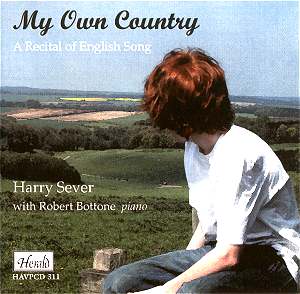Here we have a disc
that falls between a recital programme
chosen to display the abilities of the
singer or a collection including rarities
from lesser-heard composers. The soloist
was Head Chorister at Winchester College
where he still studies and has appeared
in Songs of Praise and Sunday
Half Hour. The choice of songs by
Sullivan, Parry, Gibbs and Gurney is
a good one for they ideally match the
vocal capabilities of the voice and
are under-represented in the gramophone
catalogue. It's always difficult to
please all listeners but the Quilter
folksong arrangements from the Arnold
Book of Old Songs, the Warlock works,
Gibbs' Five Eyes, and Howells’
King David are already well represented.
Perhaps consideration of providing some
melodious rarities of Benedict, Stanford
or Wood might have provided an added
attraction for the listener.
Harry Sever has a light
treble voice best suited to the higher
octaves, where he soars effortlessly.
He provides good dynamics and gives
an excellent vibrato on sustained high
notes. I should have enjoyed hearing
more use of vibrato throughout since
its control is so nicely handled and
pleasant to the ear. Much tenderness
of expression and much feeling is put
into the lovely flowing phrases of the
Gurney numbers, Rest, sweet nymph
and Lavender Pond. It is often
the case that elegant music flows from
the pen of a composer who undergoes
suffering. Gurney in particular had
a rough time in World War I and went
back to Gloucestershire shell-shocked.
I'm not sure when these compositions
were written but suspect it was after
the war. Whether or not the songs were
ones the soloist enjoyed singing or
were recommendations by others I don't
know, but his weakness is only exposed
in Dyson's Song of the Cyclops
and Head's Tewkesbury Road where
a considerable lack of strength in the
lower octaves is evident. Songs incorporating
low notes outside his compass might
have been avoided. My own country,
a lovely tune might have been improved
by transposing. Despite this, Harry
Sever may well be destined for high
achievements as a vocalist.
The accompaniment by
Robert Bottone is particularly competent.
He studied with Fanny Waterman - of
Leeds Piano competition fame - and Donald
Hunt. However, the fireworks found in
Dyson's Song of the Cyclops,
so well expressed, takes the ear off
the singer completely at one point and
makes me wonder if the work was more
fun to play than to sing. I was amused
to find a possible hidden joke in the
title of the last item that may have
some hidden meaning to the performers.
With this thought put aside, I find
this last piece to be monotonous and
uninspired Britten.
The acoustic for the
accompaniment is sensible, yet dry and
somewhat unflattering for the singer.
At places in forte passages,
the piano tends to drown the voice and
sensitivity of balance in editing could
have improved the recording.
The notes – in English
- contain all lyrics, but sadly no notes
on the composers' backgrounds.
Raymond J Walker


